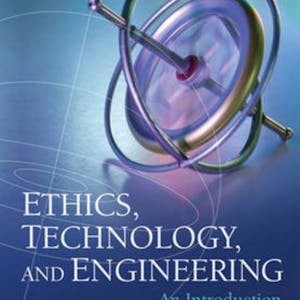Ethics, Technology and Engineering
There is an increasing attention to ethics in engineering practice. Engineers are supposed not only to carry out their work competently and skilfully, but also to be aware of the broader ethical and social implications of engineering and to be able to reflect on these. According to the Engineering Criteria 2000 of the Accreditation Board for Engineering and Technology (ABET) in the US, engineers must have “an understanding of professional and ethical responsibility” and should “understand the impact of engineering solutions in a global and societal context.” This course provides an introduction to ethics in engineering and technology. It helps engineers and students in engineering to acquire the competences mentioned in the ABET criteria or comparable criteria formulated in other countries. More specifically, this course helps engineers to acquire the following moral competencies:
- Moral sensibility: the ability to recognize social and ethical issues in engineering;
- Moral analysis skills: the ability to analyse moral problems in terms of facts, values, stakeholders and their interests;
- Moral creativity: the ability to think out different options for action in the light of (conflicting) moral values and the relevant facts;
- Moral judgement skills: the ability to give a moral judgement on the basis of different ethical theories or frameworks including professional ethics and common sense morality;
- Moral decision-making skills: the ability to reflect on different ethical theories and frameworks and to make a decision based on that reflection.
With respect to these competencies, our focus is on the concrete moral problems that engineers encounter in their professional practice. With the help of concrete cases is shown how the decision to develop a technology, as well as the process of design and production, is inherently moral. The attention of the learners is drawn towards the specific moral choices that engineers face. In relation to these concrete choices learners will encounter different reasons for and against certain actions, and they will discover that these reasons can be discussed. In this way, learners become aware of the moral dimensions of technology and acquire the argumentative capacities that are needed in moral debates with stakeholders (e.g. governments, users, and commercial business departments).
None
Syllabus
Syllabus - What you will learn from this course
Week 1
Introduction
The responsibility of engineers
Week 2
Codes of conduct
Week 3
Normative ethics
Week 4
The ethical cycle
Week 5
Ethical questions in the design of technology
Week 6
Designing morality
Week 7
Ethical aspects of technological risks
Week 8
Distribution of responsibility
Week 9
Exam
FAQ
When will I have access to the lectures and assignments?
Access to lectures and assignments depends on your type of enrollment. If you take a course in audit mode, you will be able to see most course materials for free. To access graded assignments and to earn a Certificate, you will need to purchase the Certificate experience, during or after your audit. If you don't see the audit option:
The course may not offer an audit option. You can try a Free Trial instead, or apply for Financial Aid.
The course may offer 'Full Course, No Certificate' instead. This option lets you see all course materials, submit required assessments, and get a final grade. This also means that you will not be able to purchase a Certificate experience.
What will I get if I purchase the Certificate?
When you purchase a Certificate you get access to all course materials, including graded assignments. Upon completing the course, your electronic Certificate will be added to your Accomplishments page - from there, you can print your Certificate or add it to your LinkedIn profile. If you only want to read and view the course content, you can audit the course for free.
Is financial aid available?
Yes. In select learning programs, you can apply for financial aid or a scholarship if you can’t afford the enrollment fee. If fin aid or scholarship is available for your learning program selection, you’ll find a link to apply on the description page.
Reviews
This course is also helpful for professions like engineers for ethical values and responsibilities
This course changed my perception on ethics relevant to my profession. The course is useful for not only engineers but for scientists and other professionals.
Great introductory course. This should be a must for every aspiring engineer or technology practitioner to get each in contact with one's humanity
It would have been better if there were more video lectures. Apart from that the course is all good.
